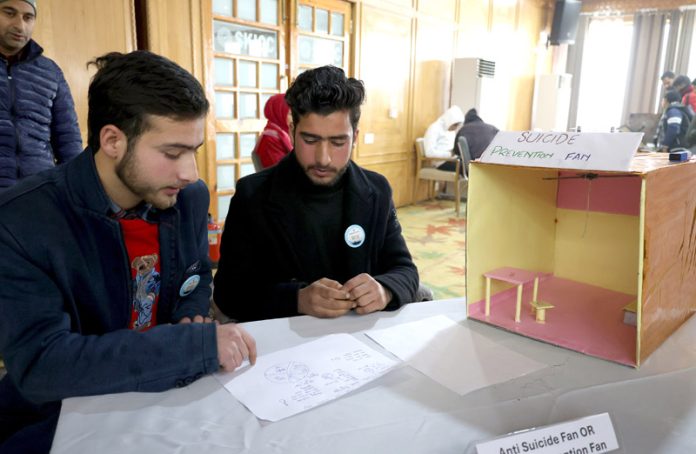
Irfan Tramboo
Srinagar, Dec 31: Two youngsters from Kulgam have developed an innovative ‘Suicide Prevention Fan’ aimed at preventing suicides caused by hanging.
Zubair Nazir and Suraj Nazir, Class 11 students from Government Higher Secondary School (GHSS) Ashmuji, presented the model during the recently held Pragaash-2024. The model was developed in the school’s Atal Tinkering Lab.
Speaking to Excelsior, Zubair said the fan is designed in such a way that if anyone attempts suicide by hanging, it raises an alarm and detaches from the base, aborting the attempt.
“This model aims to prevent suicides caused by hanging. Unlike normal fans, which allow a person to hang themselves fatally, this fan raises an alarm and breaks away from the base,” he explained.
He further noted that while the detachment aborts the suicide attempt, the alarm alerts others, enabling them to rescue the person.
Explaining the idea and motive behind the project, Zubair said that a significant percentage of suicides in the country are caused by hanging.
“We want to prevent these suicides by introducing fans that are designed to make such attempts impossible,” he said.
The event, which showcased nearly 75 models, was attended by around 200 students from across Kashmir at SKICC. It was organized by the School Education Department in collaboration with NITI Aayog, UNICEF, and the Pi-Jam Foundation.
The organizers stated that the event aimed to foster a thriving culture of innovation and create a conducive ecosystem for students and tech enthusiasts in Jammu and Kashmir.
Suraj Nazir, who was also involved in developing the prototype, highlighted the rising mental stress among youth due to various factors, leading some to end their lives.
“While this issue requires multiple interventions, we have tried to do our part by designing this fan, and we hope it makes a difference,” he said.
The students are currently working on improving the prototype to make it suitable for use in places like colleges and hostels.
“The present model has been tested, and the results are promising. We are now working on improvements, including the installation of sensors, to enhance its functionality,” they said.
Isaq Ahmad, the teacher and guide for the project, said the model is simple yet addresses a critical issue concerning human lives.

